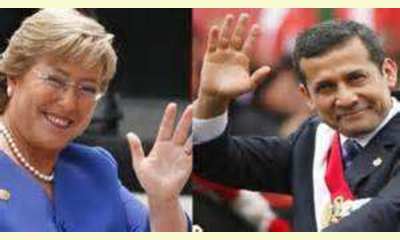|
|
Chile, Peru Plan a Future of Peace
un article par Prensa Latina
President-elect Michelle Bachelet and Peruvian
President Ollanta Humala planned today [January 27]
a peaceful future between their countries in the
wake of the ruling of the International Court of
Justice in The Hague, Holland.

Presidents Bachelet and Humala
click on photo to enlarge
The two leaders agreed in remarks made in Santiago
de Chile and Lima, respectively, in reference to
the ruling of the ICJ about their maritime border
dispute.
Bachelet, who is scheduled to meet soon at La
Moneda Palace with President Sebastian Pinera,
highlighted Chile's culture of peace and expressed
her willingness to step up cooperation with Peru
during her term.
"We have followed very carefully the ruling in The
Hague and we are happy for the recognition of the
parallel in the Marker 1 that defends our country
and protects the essential rights in an area of 80
miles," she said.
"We did not lose territorial sovereignty and this
is very relevant," she stated.
However, she lamented the decision to establish an
equidistant line from the 80 miles to mile 200,
though she stressed that top quality fishing is
operated around the 80 miles.
Meanwhile, in Lima, almost at the same time, Humala
considered that the ruling of the ICJ in The Hague
is a triumph for peace and paves the way for
cooperation and better links between two Latin
American nations.
(Click here for a Spanish version of this article)
|








|
DISCUSSION
Question(s) liée(s) à cet article:
Latin America, has it taken the lead in the struggle for a culture of peace?
* * * * *
Commentaire le plus récent:
I argued in my blog this January that indeed Latin America is now the "leading edge" of the global movement for a culture of peace.
Latin America continues to take the lead in the transition to a culture of peace.
As indicated by this month’s CPNN Bulletin, the continent was the first to establish city culture of peace commissions, as well as city commissions for components such as human rights in Sao Paulo and sustainable development in Aguascalientes. Also the invocation of the culture of peace as the basis for the Union of South American States (UNASUR) was a pioneering development.
Now, we can add to this list of innovations, the development of the culture of peace at a regional level in Brazil, Peru and Mexico. As discussed, this is an important new step since a region can be self-sustaining with regard to its agricultural basis, unlike the city.
In fact, Latin America has always been at the leading edge. The initial concept came in 1986 from an initiative in Peru headed by the Jesuit scholar Felipe MacGregor. The first national project was in El Salvador in 1993, and that experience was the basis for the adoption of the culture of peace programme by the Executive Board and General Conference of UNESCO. The further development of the culture of peace as a social movement came in 1994 from a “Group of Reflection” of Latin American experts in association with UNESCO. It was the representatives from Latin American countries at the United Nations in New York that began in 1995 the annual resolutions which led eventually to the UN Declaration and Programme of Action on a Culture of Peace. And the initial call for an International Year for the Culture of Peace came from a meeting of Latin American newspaper editors in Puebla, Mexico, in 1997.
The second and third largest number of signatures on the Manifesto 2000, by which individuals promised to support a culture of peace in their daily lives, came from Brazil (15 million) and Colombia (11 million).
During the International Decade for a Culture of Peace from 2001-2010, the rich countries, including Europe and the United States and their allies, refused to support the culture of peace, including its annual UN resolutions. . ... continuation.

|
|









